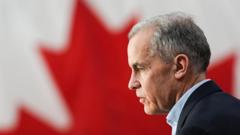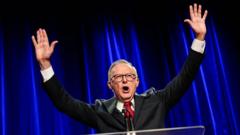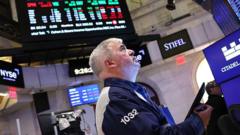Carney's victory positions him as a vital figure in navigating Canada through its challenges with the US under Trump. His approach emphasizes Canadian sovereignty, trade diversification, and the importance of strategic alliances, as he prepares for crucial summits and potential reforms in international trade.
Mark Carney's Election: A Game Changer in Canada’s Trade Dynamics

Mark Carney's Election: A Game Changer in Canada’s Trade Dynamics
With Mark Carney's recent election as Prime Minister of Canada, the narrative around trade relations and economic strategy is undergoing a significant shift.
On the final day of a fiercely contested election in Canada, Mark Carney, now Prime Minister, delivered a powerful message to his supporters about his plans to reshape the country’s economic stance amid mounting trade tensions with the United States. Carney, previously known for his work as a central banker, stunned many with his transition into a dynamic political figure campaigning aggressively against what he termed as the "chaotic" policies of his American counterpart.
During his campaign, Carney distinguished himself with a bold assertion: "America's leadership of the global economy is over," citing the disruptive impact of President Trump's trade policies on Canada. His rhetoric resonated with citizens who are wary of losing economic sovereignty, particularly in light of recent tariffs imposed on Canadian goods. The election became less about partisan lines and more about unified resistance to perceived external threats, bringing Canadians together in support of Carney's vision for a stronger national identity.
As he journeyed across the country, Carney addressed the significance of Canadian self-reliance, encouraging citizens to "support each other" through local purchasing. This approach became critical in winning back support in key regions, including Quebec, where fears of US dominance united both federalists and separatists against a common foe.
The election results showcased a remarkable turnaround for Carney and the Liberal Party, as they climbed from an alarming 16% in polls to secure victory against the Conservatives. Carney's leadership style and the urgency of his message allowed him to consolidate leftist voters and position himself as the only candidate capable of effectively managing the relationship with Trump—who had previously shown disdain for his predecessor, Justin Trudeau.
In an exclusive interview, Carney emphasized the need for Canada to navigate a "win-win" strategy with the US. His advocacy for Canada as a crucial supplier of key resources, including energy and critical minerals, indicates a shift in both economic partnerships and trade strategies moving forward.
Looking to the future, Carney must handle complex dynamics on multiple fronts, as he balances internal calls for independence with the considerations of global trade policies. With a G7 summit on the horizon, where Canada will take center stage as host, Carney is poised to assert a robust Canadian role in international trade discussions, concurrently addressing domestic pressures in an increasingly divided political landscape.
As challenges mount—both from Trump's administration and amidst growing dissatisfaction among US allies—Carney’s leadership will undoubtedly play a significant role in determining Canada’s economic trajectory in a rapidly evolving geopolitical climate. The coming months will test his administration's resolve as they engage with the United States and seek to redefine Canada’s position on the global stage.



















